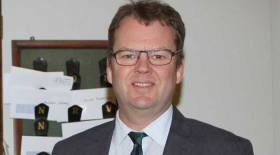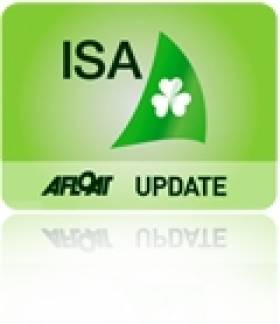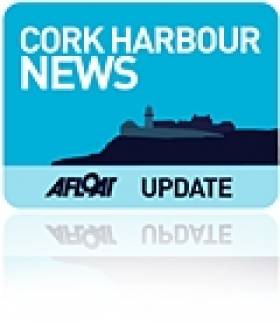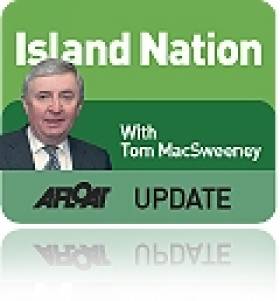Displaying items by tag: Harry Hermon
Irish Sailing Launches Recruitment Process for New CEO
Irish Sailing has launched the recruitment process for a new CEO due to the pending retirement of current chief executive Harry Hermon, as previously reported on Afloat.ie.
In the job description and role profile, the national governing body for sailing, power boating and windsurfing in Ireland says the CEO is responsible for leading the organisation to ensure the sustainability of the sport, its reputation and achievement of outstanding success”.
Among the requirements for the new CEO are establishing Irish Sailing’s strategic direction, including strategies to grow participation and encourage inclusion and diversity.
The successful candidate will take the helm during a time of “real crisis in [Irish] elite sailing”, as heard at Irish Sailing’s AGM earlier this year.
They will have significant experience within a business or similar environment, managing multiple stakeholders and funding sources, with a genuine desire to grow the sport of sailing at all levels.
They will also have “a track record of driving innovation and change”.
Irish Sailing’s recruitment partner Ascension Executive Recruitment said the salary for the role “is negotiable depending on experience”.
Applications close on Friday, 28 October and more on the role can be found via Irish Sailing’s LinkedIn page HERE.
This story was updated on Thursday 6 October to include a detail on the salary range.
ISA to Seek New CEO Following Retirement of Harry Hermon
Irish Sailing says it will begin a recruitment process for a new CEO soon, following Harry Hermon’s retirement announcement today (Thursday 1 September).
Hermon, who has held the role since 2006, is to retire this December to “spend more time with [his] family”.
During his tenure with Irish Sailing, which began in 1999 in the role of club development officer, Hermon was in the hot seat for four Olympic Games including Annalise Murphy’s historic silver medal in the Laser Radial at Rio 2016.
Commenting on his retirement, Hermon said: “It has been an honour and privilege to work with Irish Sailing over the past 23 years … With COVID-19 behind us and the organisation on a stable footing, I believe it is the right time to retire from Irish Sailing and spend more time with my family at home and overseas. I wish everyone involved in the organisation the very best in the future.”
John Twomey, president of Irish Sailing said: “I would like to thank Harry for all his work with Irish Sailing. He will be missed, and we wish him well in the future.”
What Is To Be The Future of Irish Sailing?
My Podcast this week is an interview with the Chief Executive of Irish Sailing, Harry Hermon, in which he discusses a decline in yacht ownership, lifestyle changes which have reduced the time people can give to organised club sailing, the need for more government investment in facilities for boating around the coast and the challenges facing sailing, powerboating and windsurfing in Ireland over the next five years.
The national governing body for the sport has been holding a series of meetings this week to get the views of members, clubs, sailing centres and individual sailors to help frame the development of its next strategic plan – for the years 2020 to 2025. The last one was somewhat controversial.
I attended the first meeting, held in Cork. Others were at Cullaun Sailing Club; in Castlebar and Greystones Sailing Club. The final one is scheduled for next Wednesday, October 8, at Howth Yacht Club.
The Cork meeting heard a lot of concern about a declining level of yacht ownership and lifestyle changes which have reduced the amount of time that can be given to participation in club activities, including racing. The trend of more motorboats and powerboats being sold was identified as a trend affecting sailing. The main positive for the sport is seen as being a sport for all, at all ages.
I discuss all these issues with Harry Hermon in the Podcast below.
ISA Chief Sees Bright Future for Irish Sailing
#IRISH SAILING - Irish Sailing Association (ISA) chief executive Harry Hermon took time out from the ISAF annual conference in Dublin this week to talk to Sport for Business about the growth of sailing in Ireland.
“2012 has been in many ways a breakthrough year for the sport,” he said. “We hosted so many major events during the year, from the Volvo Ocean Race finale in Galway to the World Youth Championships on Dublin Bay and of course it was an Olympic year and we had our strongest performance for many years.”
Aside from building on commercial partnerships, Annalise Murphy's near-medal-winning performance at the London Olympics was a boon for the profile of sailing in the public's imagination, and Hermon intends for the ISA to capitalise on this in the years to come, both for the Rio Games in 2016 and beyond.
“20,000 young people are coming through certified courses each year and staying with the sport," he said. "In addition we are reaching out to tens of thousands more through multi-activity camps ‘on the water’ around the coastal and inland waterways that are such an attribute in Ireland.
“We have a sport that enables 18-year-olds to race alongside their grandparents and few can offer such a crossover appeal.”
Sport for Business has much more on the story HERE.
Sheila Tyrrell to Chair New Sail Training Group
The new umbrella organisation Sail Training Ireland includes a number of key sailing people involved in sail training in Ireland including the chief executive of the Irish Sailing Association Harry Hermon and Seamus McLoughlin the head of operations of Dublin Port Company. The group also includes Kalanne O'Leary, a former member of Coiste an Asgard, the state board that ran Asgard II. The full group, chaired by Sheila Tyrrell, has been named as follows:
Sheila Tyrrell, Chair
Harry Hermon, ISA Chief Executive
Philip Cowman ISA Director, Ex Harbour Master Waterford
Kalanne O'Leary, Irish Representative on Sail Training International
Seamus McLoughlin, Head of Operations, Dublin Port
Sean Flood, Sail Training International Ambassador – Ireland.
Looking for further reading on Tall Ships in Ireland? Click the links below:
Click this link to read all our Tall Ships Stories on one handy page
Previewing Ireland's Tall Ships 2011 Season
Can Ireland Get a New Tall Ship?
Sailing Body Challenges Government
The Irish Sailing Association has told the Government that Ireland is being left behind in marine development because of the way the State has neglected the maritime sphere. I applaud the national sailing authority for making it clear that while other countries are capitalising on their natural marine assets in coastal and inland waterways, Ireland is being left behind at a significant cost to the State in lost revenue and employment opportunities.
Irish sailors have raised the profile of the sport worldwide, the Volvo Race in Galway brought international attention to Irish sailing, but the Government has failed to capitalise on this sporting success. The ISA has offered a three-year development strategy to the Department of Transport, one of five Government Departments with marine responsibility.
"As we see a decline in some of the traditional marine-related industries," says the ISA, "there is an opportunity to develop the maritime recreational sphere, to grow and attract employment opportunities in rural areas that are struggling and bring significant national and international revenue if there is greater investment in marine leisure infrastructure."
Having been advised to do so at its national conference earlier this year, the national sailing authority has also reviewed its own operational structures. From next month it will put more emphasis on providing regional support for clubs and training centres, as well as improving communications with the membership.
Two Regional Development Officers have been appointed. Denis Dillon who has been Motorboat Development Officer is taking up the role of Regional Development Officer for the Southern Region. He will work with clubs, training centres, local authorities and local sports partnerships to increase interest in sailing. Ciaran Murphy is joining the ISA as his counterpart for the Northern Region which will include Dublin. Pamela Smithwick, who has been the ISA's "Women on the Water Development Officer," is taking responsibility for club membership and liaison. Rachel Solon, the Association's Training Administrator, has been assigned the role of Communications Officer.
Harry Hermon, ISA Chief Executive, anticipates the changes will "raise the profile of the sport, resulting in a significant increase in people participating in club and training centre activity. Our aim is to increase interest amongst the wider boating community and the general public."
The Association's strategy document tells the Department that more boating usage by the public should not be restricted by unnecessary regulations, which should only be imposed where "necessary, appropriate and enforceable."
While safety must always be uppermost in sailing, there does come a time when people must take responsibility to look after themselves. The Department has not helped the sport by regulation of short-handed, single-handed sailing in Irish waters, unique in world sailing and imposed without reasonable consultation.
It is good to see the ISA standing up for the sport and its document points to what I believe is a core problem ... "As there is no longer a Department of the Marine, we have in recent years seen marine leisure interests fragmented across different Government Departments which include, Transport, Sport and Tourism, Environment, Agriculture and Fisheries and Education. The result is that there is little or no co-ordinated strategy to promote or develop the sector.
"As an island nation we have undoubtedly some of the best coastline and waterways in the world. Where other countries are capitalising on their natural assets, Ireland is being left behind at a significant cost to the State in lost revenue and employment opportunities."
A greater political awareness of the potential of sailing as a significant contributor to the economic is needed. The ISA says this requires education and awareness programmes to raise interest.
These are good proposals but Departmental bureaucrats sitting on their fat salaries, behind desks which have never felt the roll of the sea, will not like being challenged, so they may ignore the ISA.
The full ISA submission is below as a downloadable PDF.
• This article is reprinted by permission of the CORK EVENING ECHO in which Tom MacSweeney writes maritime columns twice weekly. Evening Echo website: www.eecho.ie































































